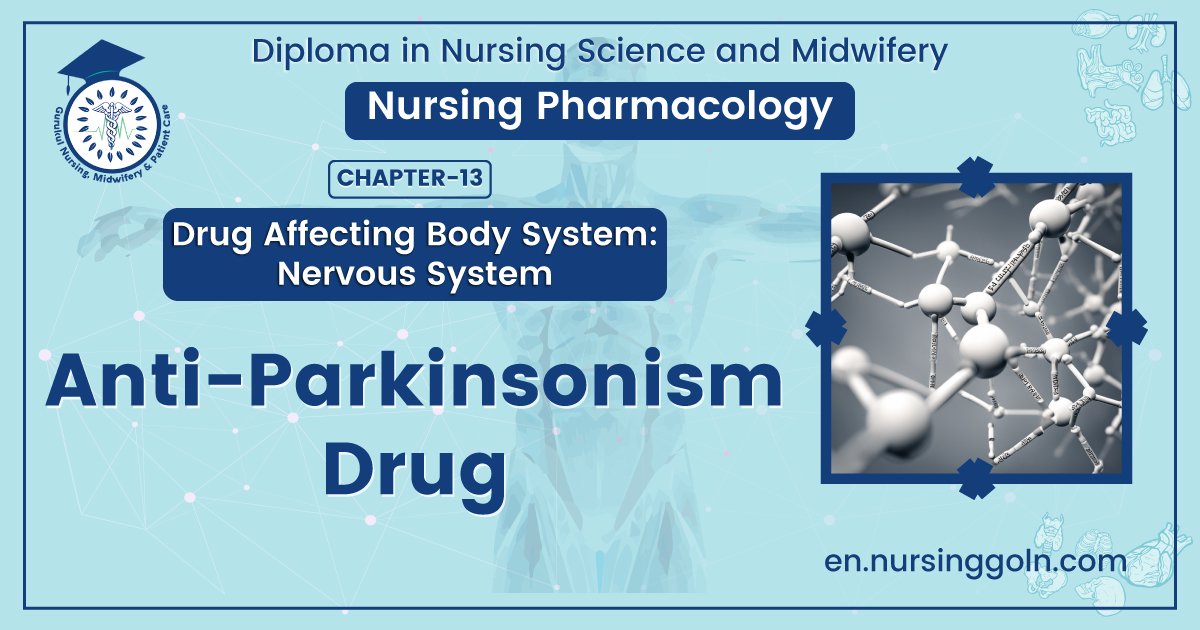Anti-Parkinsonism Drugs – This book covers the entire syllabus of “Pharmacology” prescribed by BNMC- for diploma in nursing science & midwifery students. We tried to accommodate the latest information and topics. This book is an examination setup according to the teachers’ lectures and examination questions.
At the end of the book, previous questions are given. We hope in touch with the book students’ knowledge will be upgraded and flourish. The unique way of presentation may make your reading of the book a pleasurable experience.

Anti-Parkinsonism Drugs
Parkinsonism
Degenerative disease of basal ganglia associated with, marked loss of dopamine from the basal ganglia. It is characterized by:
- Tremor at rest.
- Muscle rigidity.
- Hypokinesia.
Types of Parkinsonism
- Idiopathic Parkinsonism.
- Toxic Parkinsonism.
- Post encephalitic Parkinsonism.
Causes of Parkinsonism
- Idiopathic.
- Pathological damage to nigrostriatal dopaminergic pathway in the basal ganglia.
- Drug induced: chlorpromazine, methyldopa, reserpine
- Neurotoxin (MPГР)
- Parkinson occurs in elderly not in children.
Drugs causes Parkinsonism
1. Major tranquillisers:
- Chlorpromazine
- Haloperidol
- Reserpine
2. a-methyl dopa.
Mechanism of Parkinsonism
Normally there is a balance between acetylcholine (excitatory) and dopamine (inhibitory) transmitter in the corpus striatum (basal ganglia). Now, due to deficiency of Dopamine, the cholinergic system becomes overactive and causes Parkinsonism.
According to several explanation degeneration of Nigrostriate fibres causes Parkinsonism as these pathway are dopaminergic.

Classification of Anti-Parkinsonism drugs
Anti-parkinsonism drugs fall into following categories:
A. Anti-cholinergic:
1. Atropine
2. Scopolamine
3. Procyclidine
B. Anti-histamines:
1. Orphenadrine
2. Diphenhydramine
C. Adrenergic or Dopaminergic drugs:
1. Levodopa
2. Levodopa+Carbidopa
3. L-Dopa + Benserzide
4. Amantadine
5. Bromocriptine
D. Drugs with both anti-cholinergic and antihistaminic properties: Benzotropine.
E. Phenothiazine with anti-cholinergic and anti-histaminic actions: Promazine.
F. Mood elevators: Dextroamphetamine, imipramine
Choice of Anti-Parkinsonism drugs
1. Drug of first choice: Levo-dopa.
2. Drug of second choice: Atropine.
3. Drug of third choice: Amantadine
4. Sinemet Levodopa (250 mg) + Carbidopa (25 mg)
5. Administration of dopamine in ineffective because it cannot cross the blood brain barrier.
